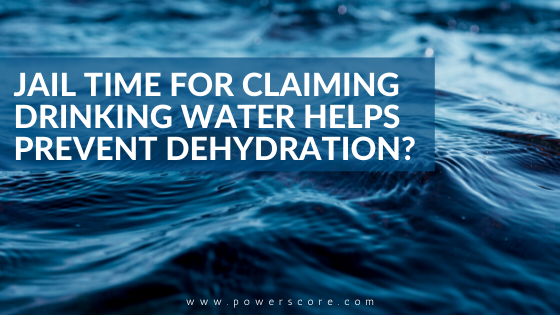In 2008, two German professors asked the European Food Safety Authority (EFSA) to approve a certain claim for use in labeling bottled water. The claim at issue was whether “regular consumption of significant amounts of water can reduce the risk of development of dehydration and of concomitant decrease of performance.”
The EFSA denied the request.
Linking Drinking Water and Dehydration
Understandably, the decision caused an uproar, especially since an apparent implication of that decision/directive was a maximum of two years imprisonment for violating its terms. Now, while I’m not a scientist, neither do I play one on TV. But it seems to me that there is some link between drinking water and preventing dehydration.
In fact, I can still hear echoing in my head the voice of my drill sergeant who, during the summer of 1996, when I was in basic training in the U.S. Army Infantry School in Ft. Benning, Georgia, gently impressed on me the connection between drinking water and hydration. Every thirty minutes or so would come the lyrically bellowed instruction to “drink waTER!” Interestingly, the forced hydration regimen employed by the Army resulted in 190 hospitalized cases of hyponatremia, a result from the overdrinking of water, between 1989 and 1999. Apparently, there is “a commonality between the initial symptoms observed for heat exhaustion and hyponatremia.”
So, is the EFSA totally out of touch with reality? The answer depends on how you present the organization’s decision. The press and various public officials decried the decision an example of failed government and an assault on common sense. One British politician ridiculed the decision made by a panel of 21 scientists after three years of analysis. A spokesperson for the United Kingdom Department of Health reportedly stated, “Of course water hydrates. While we support the EU in preventing false claims about commercial products, we need to exercise common sense as far as possible.”
The EFSA’s Ruling
However, what the EFSA actually concluded was more complicated than these statements indicate. A Forbes article by Nadia Arumugam dug further into the story. Here, it is simpler to quote the article:
The regulation pertaining to the category of the claim that the application was filed under, defines reduction of disease risk claims as those which state that the consumption of a food “significantly reduces a risk factor in the development of a human disease.” The food here was identified as water, the disease, as dehydration. Careful inspection of EFSA’s report on the scientific opinion indicates that the panel accepted these two assertions. What it objected to, was the identification of “water loss in tissues” or “reduced water content in tissues” as the risk factors, as proposed by the German scientists. The panel believed these to be “measures of water depletion and thus are measures of the disease (dehydration).”
In lay terms, these are symptoms of dehydration, i.e. conditions which are the consequence of a loss and/or lack of fluid, and therefore quite distinct from risk factors which are conditions that make an individual more likely to develop the disease. According to the Mayo Clinic, risk factors for dehydration include old age – “As you age…Your body’s ability to conserve water is reduced, your thirst sense becomes less acute and you’re less able to respond to changes in temperature,” its website says, living at high altitudes, chronic illnesses such as untreated or uncontrolled diabetes, kidney disease, adrenal gland disorders, and even a serious case of the flu.
EFSA’s ruling then, technically makes sense.”
View the LSAT in the World Around You
This set of facts, opinions, and argumentation is a cornucopia of LSAT material. There are a number of ways the LSAT could use “Water-gate” to influence creating Logical Reasoning questions. We could see a Resolve the Paradox question, or a causality-centered Weaken, Strengthen, or Justify the Conclusion question. How about a Method of Reasoning question (for the EFSA’s ruling)? A Method and Flaw hybrid (straw-man argument, anyone?), or perhaps a Parallel Reasoning question? The list goes on.
Take every opportunity to see the LSAT in the world around you. It’s a great way to keep your study fresh and avoid burnout.


Leave a Reply